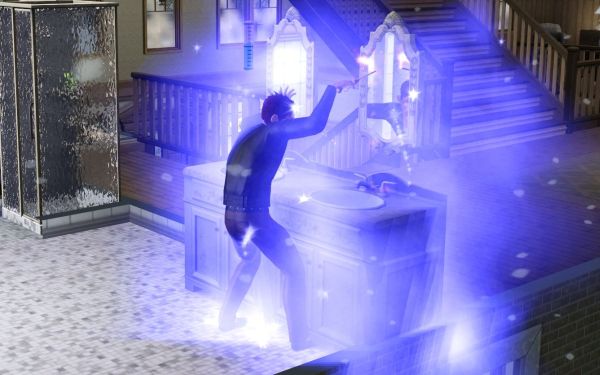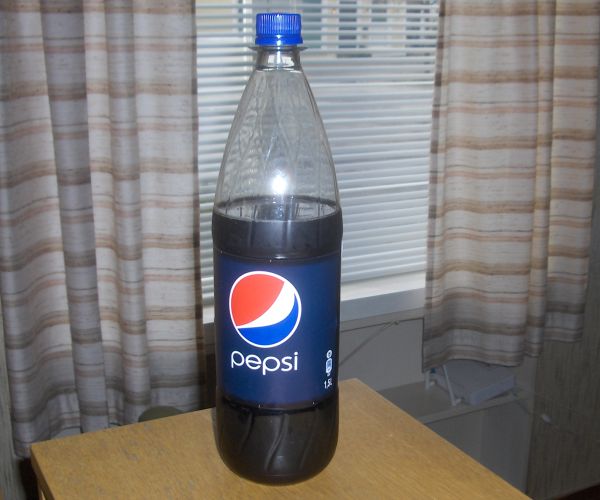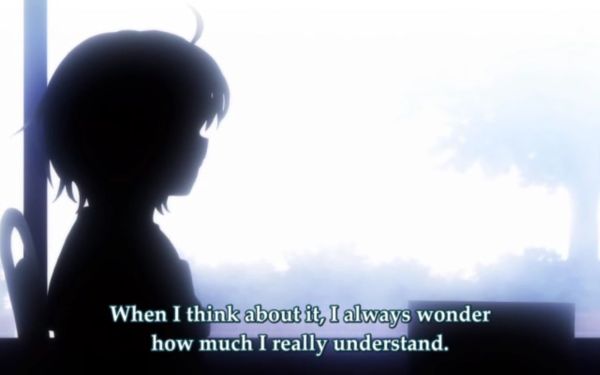
Calling on the Blue magic of Aquarius, the power over water and air! If this doesn’t clean out the sink, I don’t know what will! (Screenshot Sims 3.)
I have been surprisingly relaxed about NaNoWriMo this year. I even started my vacation a week earlier, meaning I will have to be at the office during the last week of November. That was unthinkable before. Well, there are two reasons for that, the most important being that the office will relocate from one somewhat secret location to another, and this strongly suggests my presence. ^_^ The other reason is of course The Sims 3: Into the Future, which came out this past week, the next to last week of October. I just wrote about how ridiculously excited I was about that game, remember? It was actually very enjoyable too. But NaNoWriMo is like a pilgrimage, a holy near-obligation of the writing soul.
With that out of the way, let us look at the worldbuilding for this years novel, as we usually do.
***
The working title is “Hobby mages” and the pre-production blurb is: “High school boys are easily bored, and Andreas is no exception. Having nothing better to do, he joins a game where players use their smartphones to locate ‘magic nodes’ in the real world and harness a magic that is only visible on the screen. It doesn’t hurt that he can watch the girl from his parallel class from behind as she leads them from one location to the next. But what if she is right and this is not just a game? What if a sinister conspiracy has been draining our world of magic for centuries? And what if the only thing that can prevent them from making Earth a barren wasteland forever is a bunch of squabbling, selfish and mostly juvenile gamers?”
Originally the working title was “Ingress of Magic”, because the basic idea was a kind of love child of the outdoors game Ingress and the computer game Master of Magic, both of which have been in my “Top 10 Lifetime Favorites”. If you know them, the rest of the worldbuilding very nearly writes itself. But fear not, I’ll spell it out anyway.
The world in which the story takes place is very similar to our own, although some place names are different and some towns are found in different locations. One notable difference is that smartphones / phablets are called “POC” (or PoC for the purists), meaning both “Pocket Computer” and “Point of Contact”, as they originally included telephone, text messaging and email. The name was coined by founder Gil Bates of MicroSystems Inc, a driving force in personal computing for many years. The new invention did not take off until years later, however, when the charismatic genius Joe Stubs presented the MyPOC, with a larger screen, full Interweb access and an easy-to-use interface. However, today most POCs are powered by the Robo operating system from rival GIIGA, a many-tentacled software company with the curiously pious slogan “Deliver us from evil”. Nobody has quite found out why they picked that. But it is only RoboPOCs which can run the new game, which insists it is not a game, named “Influx”.
The game (or not a game) is so named because it consists of locating and harnessing magic that supposedly flows into our world from four other worlds, each in an alternate dimension, and each magic with a different color and properties.
Celestia is the origin of the White magic of light, knowledge and protection. It mostly leaks into the world from white magic nodes that coincide in our world with places of worship and religiously themed monuments. Small scattered amounts are found around town, presumably where religious people often pass through.
Nurtura is the world from which comes the Green magic of nature, healing and fertility. It is found in small amounts in forests, park and farms, but with particular nodes in forest groves, old large trees and moss-shrouded boulders.
Aquarius is the world of Blue magic, which controls water, air and the mist of illusion. It is scattered on rivers, lakes and the sea, but its nodes are in springs, fountains and where streams or rivers join.
Energaia is the home of Red magic, the magic of raw power, heat and speed. It is associated with fire and scattered around inhabited areas, but nodes are usual power plants, smelting industries and some other factories where intense heat has been employed.
There is yet another world, Exon, which is associated with black magic. Its nodes are typically cemeteries and disaster sites. But this is not a magic that flows into our world – rather, black magic is a twisting of the four other magics and of life itself into a different force, which is then drawn into Exon, a vampiric world or black hole of magic. While using the other four colors of magic increases their presence in our world, the use of black magic reduces all forms of magic and eventually, once they are drained, life itself.
One drawback to the four “bright” magics is that the nodes can only be unlocked by a pair, two players being present together and performing certain actions in sync. After a node is unlocked, the same pair of players will need to revisit it – not necessarily together, but within 12 hours of each other in either direction – in order for the magic to flow freely. Black magic can be unlocked and drawn by a single player, as it is fundamentally different.
When a gate is locked, there is only a tiny trickle of magic. Once it is unlocked, the influx of magic quickly increases to its maximum. A pool of magic gradually forms around the node, although this is only visible on the screen of the POC, which serves as a combined map, grimoire and talisman. The pool is “full” after about 4 hours, but you can absorb it into your talisman at any point, resetting it to empty. If a pool is left full for a full week, the magic flow will begin to dwindle, and after another week the node is locked again.
To further complicate things, a pair of mages can only unlock and maintain one color of magic. This can only be reset by an elaborate procedure performed by the Head Mages which administer the e-grimoires. When reset, they lose all connection to their previous color.
Other mages of the same color can poach on each other’s nodes, as they are supposed to be allies. It is not necessarily welcome, though. It is also possible to drain the pools of other colors, but this is considered very bad form without permission, as you only receive 1/4 of the magic charge due to loss during conversion. Black mages also receive 1/4 charge, but bright mages visiting a Black site will lose charge, another oddity tilting the player field in favor of the Black.
Invisible lines connect all magic nodes in the world, known and unknown, to others of the same color. These so-called Ley lines are the only known way to increase the output from nodes above the usual 1-week maximum. A ritual is required to activate a Ley line: A pair of mages on each end must perform the ritual simultaneously, or very nearly so. It is a matter of seconds rather than minutes, so that it is impossible for the same pair to run over and perform the ritual at the other end. You need friends to work with you. The result causes a small amount of magic to leak out along the entire line, which can be harvested in a pinch. More importantly, it doubles the output of each node, including the size of its magic pool. You can even triple the output by connecting a third node, and so on. This is however rare, because a line of one color cannot cross a line of another color.
Because magic is so weak now, the effects of spells on the physical world are very subtle and indirect. Users of White magic may gradually become smarter, luckier and with sharper senses. Users of Red magic may become stronger and faster. Users of Green magic may become healthier and sexier, although our main character would not have any problems with that for quite a while! Yes, I intend to make Andreas and Malin (his magic-only partner) Green mages, with all the potential for misunderstanding that follows from this.
So yeah, that’s pretty much the worldbuilding. I intend to explain the basic principles during discussions early in the story, so they don’t appear as Deus Ex Machina later when we run into them in practice. Maybe not every detail: Magic should be somewhat mysterious and subjective, otherwise it would be science, right? ^_^






